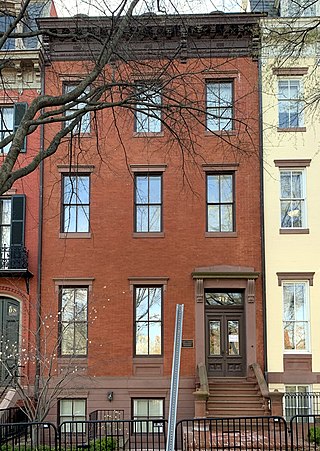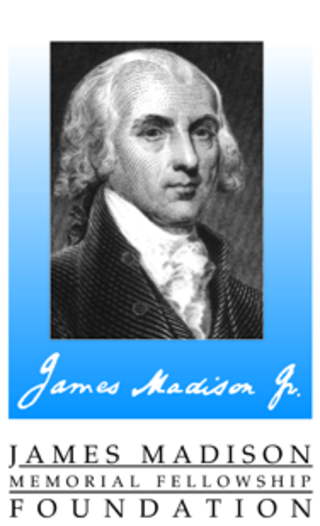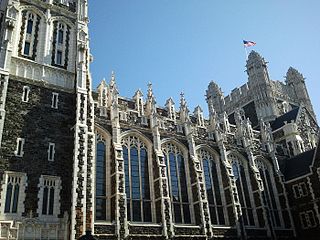Related Research Articles
The Fulbright Program, including the Fulbright–Hays Program, is one of several United States Cultural Exchange Programs with the goal of improving intercultural relations, cultural diplomacy, and intercultural competence between the people of the United States and other countries, through the exchange of persons, knowledge, and skills. Via the program, competitively-selected American citizens including students, scholars, teachers, professionals, scientists, and artists may receive scholarships or grants to study, conduct research, teach, or exercise their talents abroad; and citizens of other countries may qualify to do the same in the United States. The program was founded by United States Senator J. William Fulbright in 1946 and is considered to be one of the most widely recognized and prestigious scholarships in the world. The program provides approximately 8,000 grants annually—roughly 1,600 to U.S. students, 1,200 to U.S. scholars, 4,000 to foreign students, 900 to foreign visiting scholars, and several hundred to teachers and professionals.

The White House Fellows program is a non-partisan federal fellowship established via Executive Order by U.S. President Lyndon B. Johnson in October 1964. The fellowship is one of America’s most prestigious programs for leadership and public service, offering exceptional Americans first-hand experience working at the highest levels of the federal government. The fellowship was founded based upon a suggestion from John W. Gardner, then the president of Carnegie Corporation and later the 6th Secretary of Health, Education, and Welfare.

Residency or postgraduate training is a stage of graduate medical education. It refers to a qualified physician, veterinarian, dentist or podiatrist (DPM) who practices medicine, veterinary medicine, dentistry, or podiatry, respectively, usually in a hospital or clinic, under the direct or indirect supervision of a senior medical clinician registered in that specialty such as an attending physician or consultant. In many jurisdictions, successful completion of such training is a requirement in order to obtain an unrestricted license to practice medicine, and in particular a license to practice a chosen specialty. In the meantime they practice "on" the license of their supervising physician. An individual engaged in such training may be referred to as a resident, registrar or trainee depending on the jurisdiction. Residency training may be followed by fellowship or sub-specialty training.
The Munk School of Global Affairs and Public Policy at the University of Toronto is an interdisciplinary academic centre with various research and educational programs committed to the field of globalization. Located in Toronto, Ontario, it offers master's degrees in global affairs and public policy, as well as in European, Russian and Asia-Pacific studies. The school is a member of the Association of Professional Schools of International Affairs (APSIA), a group of schools that educate students in international affairs. Admission to the Munk School is highly competitive; the Master of Global Affairs program typically receives between 500 and 600 applicants per year but offers only 80 first-year places.
The Association of Professional Schools of International Affairs (APSIA) is a non-profit educational organization of graduate schools of international affairs, with 40 members and 26 affiliates around the world.

Medical education in Australia includes the educational activities involved in the initial and ongoing training of Medical Practitioners. In Australia, medical education begins in Medical School; upon graduation it is followed by a period of pre-vocational training including Internship and Residency; thereafter, enrolment into a specialist-vocational training program as a Registrar eventually leads to fellowship qualification and recognition as a fully qualified Specialist Medical Practitioner. Medical education in Australia is facilitated by Medical Schools and the Medical Specialty Colleges, and is regulated by the Australian Medical Council (AMC) and Australian Health Practitioner Regulation Agency (AHPRA) of which includes the Medical Board of Australia where medical practitioners are registered nationally.
The Presidential Management Fellows (PMF) Program is a two-year training and leadership development program at a United States government agency, administered by the U.S. Office of Personnel Management (OPM), for advanced degree holders. After completing the program, agencies may convert PMFs to permanent federal civilian employees.

The Edward J. Bloustein School of Planning and Public Policy of Rutgers University serves as a center for the theory and practice of urban planning, public policy and public health/health administration scholarship. The school is located in New Brunswick, New Jersey, and was named in honor of the former Rutgers University president, Edward J. Bloustein. Through its academic programs and research centers, the Bloustein School engages in instruction and research, and combines learning and application. The school's strengths and the specializations of its faculty are vast and many of its faculty members are the founders of theories or practices that are now commonplace in urban planning and policy. Areas of expertise for Bloustein faculty members include transportation planning and the environment, urban and community health, workforce development, and social justice.
The Institute for Citizens & Scholars is a nonpartisan, non-profit based in Princeton, New Jersey that aims to strengthen American democracy by “cultivating the talent, ideas, and networks that develop lifelong, effective citizens.” It administers programs that support civic education and engagement, leadership development, and organizational capacity in education and democracy.

Coro is an American non-partisan, non-profit organization best known for its fellowship program dedicated to teaching skills useful in leadership in public affairs to young adults.

The Thomas R. Pickering Foreign Affairs Fellowship Program is a graduate school fellowship program that provides funding for graduate students as they prepare academically and professionally to enter the U.S. Foreign Service.
Arts administration is a field in the arts sector that facilitates programming within cultural organizations. Arts administrators are responsible for facilitating the day-to-day operations of the organization as well as the long term goals by and fulfilling its vision, mission and mandate. Arts management became present in the arts and culture sector in the 1960s. Organizations include professional non-profit entities. For examples theaters, museums, symphonies, jazz organizations, opera houses, ballet companies and many smaller professional and non-professional for-profit arts-related organizations. The duties of an arts administrator can include staff management, marketing, budget management, public relations, fundraising, program development evaluation, and board relations.
The Executive Fellowship Program is sponsored by the California State Center for California Studies and the Office of the Governor to provide an experiential learning opportunity in California state government. Fellows work full-time in high levels of the Executive branch and meet weekly for graduate seminars. This program uniquely integrates work experiences with academic and professional development.
The Pepperdine University School of Public Policy (SPP) is a Master of Public Policy (MPP) degree program, located in Malibu, California with summer classes offered in Washington, DC. It is one of four graduate schools at Pepperdine University. The MPP is customized with specializations in Applied Economic Policy, American Policy and Politics, International Relations and National Security, State and Local Policy, and Public Policy Dispute Resolution.
The Thomas Jefferson Program in Public Policy is a graduate and undergraduate program at the College of William and Mary, founded in 1987. It enrolled its first class of graduate students in 1991. It is among the College's most interdisciplinary and collaborative programs with many students graduating with a joint degree in public policy and another specialty area, such as business (M.P.P./M.B.A.), law (M.P.P./J.D.), marine science (M.P.P./M.S.), or operations research. Most public policy classes take place in Tyler Hall. The College of William and Mary itself was chartered on February 8, 1693, by King William III and Queen Mary II as the second college in the American colonies.

The Institute of Bankers Pakistan (IBP), established in 1951, is Pakistan's premier banking training institute, which aims to develop and groom a cadre of banking and financial services professionals on continuous basis. It is an ISO-9001-2000 Certified Organization. IBP has its head office in Karachi.

The James Madison Memorial Fellowship Foundation was established by the United States Congress in 1986 to encourage outstanding current and future secondary school teachers of American history, American government, and social studies in grades 7 through 12 to undertake graduate study of the roots, framing, principles, and development of the Constitution of the United States. The Foundation thus permanently commemorates the bicentennial of the Constitution and honors James Madison, fourth President of the United States and generally acknowledged "Father of the Constitution and the Bill of Rights."

Colin Powell School for Civic and Global Leadership at the City College of New York (CCNY) is a nonpartisan educational, training, and research center named for its founder, General Colin L. Powell, USA (Retired), a graduate of CCNY. The goals of the Powell School are to build leaders for the common good, promote civic engagement, and strengthen connections between the campus and neighboring communities. The current dean is Andrew Rich.
The Royal Australasian College of Medical Administrators (RACMA) is an accredited specialist medical college comprising medical practitioners with specialist training in management and leadership of health services and systems. Fellows of the college combine clinical knowledge, skill, and judgement and apply this at an organisation wide level. This may include administering or managing a hospital or other health service, or developing health operational policy, or planning or purchasing health services. The college is responsible for the training of medical professionals as specialist health leaders in Australia and New Zealand and has responsibility for assessing candidates and awarding the qualification of Fellowship of the college (FRACMA) to medical practitioners.
References
- 1 2 3 4 5 2008 Dunn Fellowship application
- ↑ Internship Opportunities, Office of Governor Rod R. Blagojevich: http://www.illinois.gov/gov/intopportunities.cfm Archived 2008-05-01 at the Wayback Machine